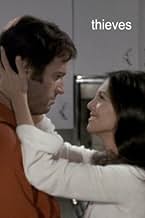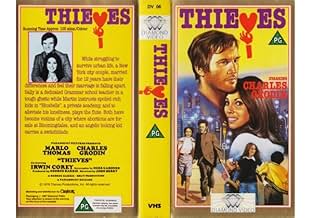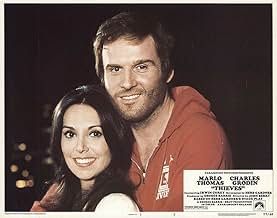Ajouter une intrigue dans votre langueDramedy of a native New York married couple who splits up in an attempt to rediscover their sanity.Dramedy of a native New York married couple who splits up in an attempt to rediscover their sanity.Dramedy of a native New York married couple who splits up in an attempt to rediscover their sanity.
- Réalisation
- Scénario
- Casting principal
Larry B. Scott
- Carlton
- (as Larry Scott)
Kenneth Kimmins
- Stanley
- (as Ken Kimmins)
MacIntyre Dixon
- Passenger
- (as MacIntryre Dixon)
Avis à la une
I'm encouraged and happy to see such enthusiastic reviews of this film, and from people who (apparently) never saw the play upon which it is based. Because that means that, for some, what the play had translates to the screen.
For me ... I saw THIEVES on Broadway. It had a stellar supporting cast and two of the same leads as the film: Marlo Thomas and, as her father, Irwin Corey. Marlo's husband was played by the late, great Richard Mulligan. At the time, Charles Grodin was director (having taken over out of town, when a bewildered Michael Bennett decided it was unfixable). In the film, Grodin has assumed the role of the husband and he's fine (he has a subtle touch which is a nice enough trade off for Mulligan's manic intensity). And what one can be grateful for is that the play has been preserved in this manner at all. It's a respectable document of a too-long-neglected work by one of America's best dramatists (Herb Gardner wrote the screenplay too, which despite a few frustrating cutting room edits, sticks close to the outline of the play).
The flip side is that the film doesn't lift the material. As filmmaking it's kind of flat and often seems like nothing more than the play being filmed on location, almost documentary style. It is, however, better than nothing.
As others have noted, THIEVES is indeed unavailable as a commercial release (unless you find the rare UK videotape in PAL format). And it should have at least that much life. But it hasn't completely vanished: that selfsame British videotape has been digitized for home-brewed DVDs and can be found on renegade disks sold on certain internet sites by certain internet vendors. IMDb rules say I cannot specify where, but creative web-browsing should eventually lead you to a relatively inexpensive copy. And indeed, that's how I located mine. *I OFFER* you that advice for free.
For me ... I saw THIEVES on Broadway. It had a stellar supporting cast and two of the same leads as the film: Marlo Thomas and, as her father, Irwin Corey. Marlo's husband was played by the late, great Richard Mulligan. At the time, Charles Grodin was director (having taken over out of town, when a bewildered Michael Bennett decided it was unfixable). In the film, Grodin has assumed the role of the husband and he's fine (he has a subtle touch which is a nice enough trade off for Mulligan's manic intensity). And what one can be grateful for is that the play has been preserved in this manner at all. It's a respectable document of a too-long-neglected work by one of America's best dramatists (Herb Gardner wrote the screenplay too, which despite a few frustrating cutting room edits, sticks close to the outline of the play).
The flip side is that the film doesn't lift the material. As filmmaking it's kind of flat and often seems like nothing more than the play being filmed on location, almost documentary style. It is, however, better than nothing.
As others have noted, THIEVES is indeed unavailable as a commercial release (unless you find the rare UK videotape in PAL format). And it should have at least that much life. But it hasn't completely vanished: that selfsame British videotape has been digitized for home-brewed DVDs and can be found on renegade disks sold on certain internet sites by certain internet vendors. IMDb rules say I cannot specify where, but creative web-browsing should eventually lead you to a relatively inexpensive copy. And indeed, that's how I located mine. *I OFFER* you that advice for free.
THIEVES is based on Herb Gardner's 1974 play that ran for more than 300 performances on Broadway. It's not an easy film story to watch, but the performers are all so good you can't stop watching. Marlo Thomas repeats her stage role as Sally, the feisty teacher in a ghetto school married to dullard Marty (Charles Grodin) who's the principal at a posh private school. Fifteen years before they had been social rebels, demonstrators, and involved. Now they've become increasingly isolated in their comfy high-rise world. Sally has retained some rebellious fire, but she's afraid to admit the marriage is over. Over the course of a fateful night and the following day, they meet a series of people who help them examine and define their lives. While Sally tries to confront her loveless marriage and a possible abortion, Marty tries to find his own roots in an abandoned theater. Solid supporting cast has John McMartin, Ann Wedgeworth, Hector Elizondo, and others living in urban isolation. Best of all and an amazing surprise is Irwin Corey as Sally's cab-driver father and one-time Vaudeville player. His seemingly senseless rants that become monologues about finding cohesion in a splintered world are often very funny but also sad in their truthfulness. Others in the film are Mercedes McCambridge, Gary Merrill, Bob Fosse, Alice Drummond, and Zvee Scooler. Grodin had directed the stage version. Best thing I've ever seen Marlo Thomas do.
I saw this movie once, in 1977, and I still think of it at times. The humor was ahead of it's time then, and still funny now.
The philosophy, and the origin of the title, holds up well.
Are the players crazy? Or are they doing the only thing they can to cope in an insane world? Some of their choices, especially when it comes to moving, appear out-of-the-ordinary. But when we learn the reasons for their actions, we start to see some clever tools for holding their marriage together at all costs.
Marlo Thomas is her usual, lovable self. Charles Grodin has never been funnier.
The dialog is clipped, (think His Girl Friday), and filled with nonsense and good sense. Some of it will stay with you for years.
The philosophy, and the origin of the title, holds up well.
Are the players crazy? Or are they doing the only thing they can to cope in an insane world? Some of their choices, especially when it comes to moving, appear out-of-the-ordinary. But when we learn the reasons for their actions, we start to see some clever tools for holding their marriage together at all costs.
Marlo Thomas is her usual, lovable self. Charles Grodin has never been funnier.
The dialog is clipped, (think His Girl Friday), and filled with nonsense and good sense. Some of it will stay with you for years.
10claster
Okay, sure, it's talky. But such wonderful talk. Indelible characters, profound humor, and amazing speeches. This movie should not be as forgotten as it is. In its own talky way, it's brilliant. This, along with "A Thousand Clowns," absolutely deserves a DVD release. Marlo Thomas' performance is incisive and touching. Charles Grodin is the perfect foil for her. Irwin Corey, as her father, has what may be the best speech in the movie (and one of the best speeches in all movies) when he gives her an extra year of life. Look for a nifty cameo from Bob Fosse, and catch Jule Styne singing on the soundtrack. But the star here is Herb Gardner, with his wonderful sensitive writing. Do whatever you have to in order to see this forgotten gem.
I was drawn to "Thieves" (1977) mainly because it was written by Herb Gardner, who also wrote "Who Is Harry Kellerman And Why Is He Saying Those Terrible Things About Me?" (1971), a film I watched recently and found uncommonly inventive. "Thieves" shares some of the same characteristics - both of these films are a rare breed: American cinema of ideas. At its best, "Thieves" can stand up to comparison with any of Woody Allen's movies; like most of his, it is set and shot in Manhattan and captures the chaos and messiness of the city. There are some wonderful, even wise moments in this film, and Marlo Thomas is a gem. There is also one awful, atrociously over-acted character (the cab driver) who should have been cut out altogether. *** out of 4.
Le saviez-vous
- AnecdotesDuring press for this film, Marlo Thomas did an interview with Phil Donahue on his show The Phil Donahue Show (1967). According to her, there was "instant spark" between them. They married in 1980.
- GaffesThe Loew's theater chain was typically pronounced LOH-EEZE by many New Yorkers in mid 20th Century.
- Bandes originalesThe Kaminsky Rag
Composed and Performed by Jule Styne
Meilleurs choix
Connectez-vous pour évaluer et suivre la liste de favoris afin de recevoir des recommandations personnalisées
Détails
Contribuer à cette page
Suggérer une modification ou ajouter du contenu manquant


















